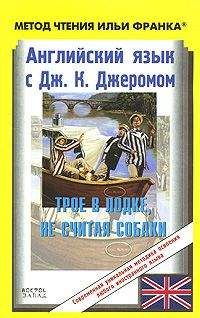Jerome Jerome - Английский язык с Джеромом К. Джеромом. Трое в лодке, не считая собаки (ASCII-IPA)
account [@'kaunt] mystery ['mist(@)rI] purpose [' [email protected]: [email protected]]
"There she goes," he said, "there she goes, with two pounds' worth of food on board that belongs to me, and that I haven't had."
He said that if they had given him another day he thought he could have put it straight.
So I set my face against the sea trip. Not, as I explained, upon my own account. I was never queer. But I was afraid for George. George said he should be all right, and would rather like it, but he would advise Harris and me not to think of it, as he felt sure we should both be ill. Harris said that, to himself, it was always a mystery how people managed to get sick at sea — said he thought people must do it on purpose, from affectation — said he had often wished to be, but had never been able.
Then he told us anecdotes of how he had gone across the Channel (потом он рассказал нам /несколько/ случаев, как он пересекал Ла-Манш; anecdote — короткий рассказ; эпизод, случай; across — поперек; в ширину; от края до края; channel — канал, пролив) when it was so rough that the passengers had to be tied into their berths (когда /море/ было настолько бурным, что пассажиров приходилось привязывать к койкам; rough — грубый, жесткий; бурный /о море/, суровый /о климате/), and he and the captain were the only two living souls on board who were not ill (а он и капитан были единственными /двумя живыми душами/ на борту, кто не болел). Sometimes it was he and the second mate who were not ill (иногда это были он и второй помощник капитана, кто не болел); but it was generally he and one other man (но как правило, это были = здоровыми оставались он и еще кто-нибудь). If not he and another man, then it was he by himself (если не он и кто-нибудь еще, то он один).
It is a curious fact, but nobody ever is sea-sick — on land (любопытное дело, но никто никогда не страдает морской болезнью на суше). At sea, you come across plenty of people very bad indeed (в море вы встречаете множество людей, действительно очень больных; to come across — /случайно/ встретиться с кем-либо; /неожиданно/ натолкнуться; bad — плохой, скверный; испорченный; больной), whole boat-loads of them (целые лодки /их/; boatload — полная нагрузка лодки; load — груз); but I never met a man yet, on land (но я никогда не встречал еще человека на суше), who had ever known at all what it was to be sea-sick (который бы вообще знал, что значит страдать морской болезнью; to know). Where the thousands upon thousands of bad sailors that swarm in every ship (куда тысячи и тысячи плохо переносящих качку, которые кишат на каждом корабле; sailor — матрос, моряк; to be a bad sailor — плохо переносить качку на море; to swarm — толпиться, кишеть) hide themselves when they are on land is a mystery (прячутся, когда оказываются на берегу, — это тайна).
rough [rVf] curious ['kju(@) [email protected]] thousand ['Tauz(@)nd] swarm [swO:m]
Then he told us anecdotes of how he had gone across the Channel when it was so rough that the passengers had to be tied into their berths, and he and the captain were the only two living souls on board who were not ill. Sometimes it was he and the second mate who were not ill; but it was generally he and one other man. If not he and another man, then it was he by himself.
It is a curious fact, but nobody ever is sea-sick — on land. At sea, you come across plenty of people very bad indeed, whole boat-loads of them; but I never met a man yet, on land, who had ever known at all what it was to be sea-sick. Where the thousands upon thousands of bad sailors that swarm in every ship hide themselves when they are on land is a mystery.
If most men were like a fellow I saw on the Yarmouth boat one day (если бы большинство людей было похоже на парня, /которого/ я видел однажды на ярмутском = шедшем в Ярмут корабле; boat — лодка, шлюпка; корабль, судно), I could account for the seeming enigma easily enough (я мог бы объяснить эту кажущуюся тайну довольно легко; to account for — давать отчет; объяснять; принимать во внимание). It was just off Southend Pier, I recollect (/корабль/ как раз отошел от саусэндского мола, /насколько/ помню; to be off — уходить; начинать движение; pier — мол; волнолом; дамба, пирс, причал; to recollect — вспоминать, припоминать), and he was leaning out through one of the port-holes in a very dangerous position (и он /парень/ высовывался из иллюминатора в очень опасном положении; port-hole: port — порт; отверстие; левый борт; hole — дыра, отверстие). I went up to him to try and save him (я подошел к нему, чтобы попытаться спасти его).
"Hi (эй)! come further in (отойдите назад; to come in — входить; further — добавочный, дальнейший; дальше)," I said, shaking him by the shoulder (сказал я, тряся его за плечо). "You'll be overboard (вы упадете за борт; overboard — за борт; за бортом)."
"Oh my! I wish I was (ну да, я этого и хочу; oh my — вот тебе на! вот это да! подумать только!)," was the only answer I could get (был единственный ответ, /который/ я смог получить); and there I had to leave him (и здесь = и на этом мне пришлось оставить его).
Three weeks afterwards, I met him in the coffee-room of a Bath hotel (три недели спустя я встретил его в столовой гостиницы в Бате; afterwards — впоследствии, позднее, потом; to meet; coffee-room — кафе, столовая в гостинице), talking about his voyages, and explaining, with enthusiasm, how he loved the sea (говорившего = где он рассказывал о своих плаваниях и объяснял с воодушевлением, как он любит море).
dangerous [' [email protected]@s] answer ['A: [email protected]] enthusiasm [In'Tju:zI&zm]
If most men were like a fellow I saw on the Yarmouth boat one day, I could account for the seeming enigma easily enough. It was just off Southend Pier, I recollect, and he was leaning out through one of the port-holes in a very dangerous position. I went up to him to try and save him.
"Hi! come further in," I said, shaking him by the shoulder. "You'll be overboard."
"Oh my! I wish I was," was the only answer I could get; and there I had to leave him.
Three weeks afterwards, I met him in the coffee-room of a Bath hotel, talking about his voyages, and explaining, with enthusiasm, how he loved the sea.
"Good sailor (укачивало ли; to be a good sailor — хорошо переносить качку на море)!" he replied in answer to a mild young man's envious query (сказал он в ответ на завистливый вопрос какого-то кроткого молодого человека; to reply — отвечать, отзываться; envious — завистливый, завидующий; query — вопрос; сомнение); "well, I did feel a little queer once, I confess (ну, признаюсь, меня немного подташнивало однажды; to confess — признавать/ся/, сознаваться). It was off Cape Horn (это было у мыса Горн). The vessel was wrecked the next morning (судно потерпело крушение на следующее утро)."
I said:
"Weren't you a little shaky by Southend Pier one day (/разве/ вы не приболели немного у саусэндского мола однажды; shaky — трясущийся, дрожащий; слабый, шаткий /о здоровье/; нетвердый), and wanted to be thrown overboard (и хотели, чтобы вас выбросило за борт; to throw-threw-thrown)?"
"Southend Pier!" he replied, with a puzzled expression (ответил = повторил он с озадаченным выражением /лица/).
"Yes; going down to Yarmouth, last Friday three weeks (да, плывя в Ярмут, в прошлую пятницу, три недели /назад/; to go down — спускаться, опускаться)."
envious [' [email protected]] query [' [email protected]] wrecked [rekt]
"Good sailor!" he replied in answer to a mild young man's envious query; "well, I did feel a little queer once, I confess. It was off Cape Horn. The vessel was wrecked the next morning."
I said:
"Weren't you a little shaky by Southend Pier one day, and wanted to be thrown overboard?"
"Southend Pier!" he replied, with a puzzled expression.
"Yes; going down to Yarmouth, last Friday three weeks."
"Oh, ah — yes (ах, да)," he answered, brightening up (ответил он, сияя; to brighten up — прояснять/ся/, просиять; наполняться радостью); "I remember now (вспоминаю теперь). I did have a headache that afternoon (у меня действительно болела голова в тот день; to have a headache — страдать от головной боли; afternoon — время после полудня; послеобеденное время). It was the pickles, you know (это были пикули = это из-за пикулей, знаете; pickles — соленья, пикули, соленые или маринованные огурцы). They were the most disgraceful pickles I ever tasted in a respectable boat (это были самые позорные = отвратительные пикули, /которые/ я когда-либо пробовал на приличном корабле; respectable — почтенный, представительный; респектабельный; приличный). Did you have any (а вы пробовали /их/)?"
For myself, I have discovered an excellent preventive against sea-sickness, in balancing myself (что касается меня, я обнаружил превосходное профилактическое средство против морской болезни, /состоящее/ в сохранении равновесия; preventive — предупредительный, предохранительный; профилактическое средство). You stand in the centre of the deck (вы становитесь в центр палубы), and, as the ship heaves and pitches (и, когда корабль качается; to heave — вздыматься, подниматься и опускаться /обычно в каком-либо ритме/; to pitch — падать, подвергаться килевой качке /о корабле/), you move your body about, so as to keep it always straight (вы двигаете свое тело так, чтобы всегда держать его прямым; to move about — переходить с места на место, переезжать; передвигать; body — тело, туловище). When the front of the ship rises, you lean forward (когда нос корабля поднимается, вы наклоняетесь вперед; front — фасад; передняя сторона; носовая часть), till the deck almost touches your nose (до тех пор, пока палуба почти касается вашего носа); and when its back end gets up, you lean backwards (а когда его задняя часть поднимается, вы откидываетесь назад). This is all very well for an hour or two (все это очень хорошо на час или два); but you can't balance yourself for a week (но вы не сможете сохранять равновесие неделю).
headache ['hedeIk] respectable [rIs' [email protected](@)l] disgraceful [dIs'greIsful]
"Oh, ah — yes," he answered, brightening up; "I remember now. I did have a headache that afternoon. It was the pickles, you know. They were the most disgraceful pickles I ever tasted in a respectable boat. Did you have any?"
For myself, I have discovered an excellent preventive against sea-sickness, in balancing myself. You stand in the centre of the deck, and, as the ship heaves and pitches, you move your body about, so as to keep it always straight. When the front of the ship rises, you lean forward, till the deck almost touches your nose; and when its back end gets up, you lean backwards. This is all very well for an hour or two; but you can't balance yourself for a week.
George said:
"Let's go up the river (давайте поднимемся по реке/отправимся вверх по реке)."



